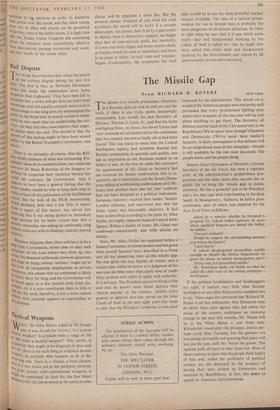The Missile Gap
From RICHARD H. ROVERE NEW YORK mHE debate over missile production, American I and Russian, goes on and on and on, and the truth, if there is ,any truth, seems increasingly unattainable. Last month the new Secretary of Defence, Thomas S. Gates, Jr., said that the latest intelligence from, or about, the Soviet Union and 'new' methods of calculation led to the conclusion that this country was not as badly off as had been feared. This was taken to mean that the Central Intelligence Agency had somehow learned that Russian production, in quantity and quality, was not as impressive as the Russians wished us to believe it was. At the time he made this statement the appointment of Mr. Gates as Secretary had not received the Senate confirmation that is re- quired by the Constitution, and the Senate Demo- crats talked of withholding confirmation until Mr. Gates had satisfied them that his 'new' methods had not been designed as a political instrument. Someone, however, reached their leader, Senator Lyndon Johnson, and convinced him that the Gates report was thoroughly objective. It had been so described, according to the press, by Allen Dulles. the highly respected head of Central Intel- ligence. Within a matter of hours, Mr. Gates was confirmed—unanimously and with almost no debate.
Now, Mr. Allen Dulles has appeared before a Senate Committee, in closed session, and has given what several Senators have described as a bleak and all but despairing view of the missile gap. No one gives out any figures, of course, and a citizen who wishes to arrive at a judgment of his own can do little more than apply tests of credi- bility to those who claim to speak with authority. It is not easy. The President says everything is fine and that he knows more about defence than 'almost anyone' in the country. Almost every general or admiral who has served on the Joint Chiefs of Staff in the past eight years has made it clear that the President's expertise is not much respected by his subordinates. This would carry weight if the American people were not pretty well persuaded that every professional fighting man wants more weapons all the time and will say just about anything to get them. The Secretary of Defence and the head of the CIA cancel out, as do Republican ('We've never been stranger') Senators and Democratic (We've never been weaker') Senators. A likely consequence is that defence will be an insignificant issue in the campaign—though it will probably be the one most discussed. The peoplelisten, and the people shrug.
Senator Stuart Symington of Missouri, a former Secretary of the Air Force, has been a vigorous critic of the administration's preparedness pro- gramme and has done more than anyone else in public life to bring the 'Missile gap' to public attention. He has a powerful yen to be President and a few days ago went vote-hunting in the deep South. In Montgomery, Alabama, he held a press conference, part of which was reported by the New York Times as follows: Asked by a reporter whether he favoured a proposal for federal ballot registrars in areas where qualified Negroes are denied the ballot,' he replied :
'I haven't studied it.'
Would he support the anti-lynching measure now before the Senate?
'I don't know.'
Is school desegregation proceeding rapidly enough or should the Justice Department be given the power to initiate desegregation suits? 'In my state, it is proceeding rapidly.'
Mr. Symington spoke out firmly on what he called the chief issue of the coming campaign— world peace.
If the political bookmakers and handicappers are right, it matters very little what Senator Symington or any other Democratic candidate has to say. These sages are convinced that Richard M. Nixon is all but unbeatable. One Democrat may do better than other against him, but unless the mood of the country undergoes an immense change-in the next few months, Mr. Nixon will be in the White House a year from now. Khrushchev could alter this prospect, and so per- haps could Mao Tse-tung, but the guessers are borrowing no trouble and guessing that peace will last out the year, with Mr. Nixon the gainer. The opinion polls all seem to bear them out. Most of them continue to show that the people think highly of him and, unlike the professors of political science, are not dismayed by the prospect of having their laws written by Democrats and executed by Republicans. In fact, this seems to appeal to American fairmindedness.






































 Previous page
Previous page